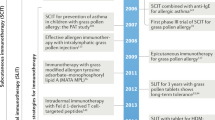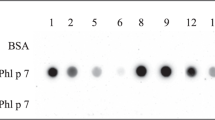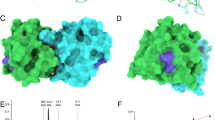Abstract
ALLERGIC diseases such as hay fever, extrinsic asthma, drug hypersensitivities and some forms of urticaria are mediated by allergen-specific antibodies of the IgE class, known also as reagins. Specific suppression of the IgE antibodies to haptens and protein antigens has been achieved recently by injection of conjugates of haptens with non-immunogenic carriers1–5 or by appropriately modified allergens6–8. Here we describe a new method for converting a well defined protein antigen, such as ovalbumin (OA), or the mixture of the non-dialysable allergenic constituents of the aqueous extract of ragweed pollen (RAG), to tolerogenic and non-allergenic products which are capable of abrogating the primary as well as ongoing IgE responses to the corresponding native allergens in B3D2F1 mice and rats. Our method involves the covalent coupling of the allergens to the non-immunogenic, hydrophilic polymer, polyethylene glycol (PEG); this approach was inspired by the report that coupling of PEG to catalase and bovine serum albumin resulted in loss of the immunogenicity of these proteins9.
This is a preview of subscription content, access via your institution
Access options
Subscribe to this journal
Receive 51 print issues and online access
$199.00 per year
only $3.90 per issue
Buy this article
- Purchase on Springer Link
- Instant access to full article PDF
Prices may be subject to local taxes which are calculated during checkout
Similar content being viewed by others
References
Katz, D. H., Hamaoka, T. & Benacerraf, B. J. exp. Med. 136, 1404–1429 (1972).
Havas, H. F. Immunology 17, 819–829 (1969).
Golan, D. T. & Borel, Y. J. exp. Med. 134, 1046–1061 (1971).
Lee, W. Y. & Sehon, A. H. J. Immun. 114, 829–836 (1975).
Lee, W. Y. & Sehon, A. H. J. Immun. 117, 927–934 (1976).
Ishizaka, K., Okudaira, H. & King, T. P. J. Immun. 114, 110–115 (1975).
Takatsu, K. & Ishizaka, K. J. Immun. 116, 1257–1264 (1976).
Bach, M. K. & Brashler, J. R. J. Immun. 114, 1799–1807 (1975).
Abuchowski, A., thesis, Rutgers Univ., New Brunswick, N.J. (1975).
Sharon, R., McMaster, P. R. B., Kask, A. M., Owens, J. D. & Paul, W. E. J. Immun. 114, 1585–1589 (1975).
Pan, D., Lee, W. Y., Sehon, A. H. & Bazin, H. Fedn Proc. 35, 433 (1976).
Green, I., Paul, W. E. & Benacerraf, B. J. exp. Med. 127, 43–53 (1968).
Lee, W. Y. & Sehon, A. H. J. Immun. 114, 837–842 (1975).
King, T. P., Kochoumian, L. & Lichtenstein, L. M. Archs Biochem. Biophys. 178, 442–450 (1977).
Author information
Authors and Affiliations
Rights and permissions
About this article
Cite this article
LEE, W., SEHON, A. Abrogation of reaginic antibodies with modified allergens. Nature 267, 618–619 (1977). https://doi.org/10.1038/267618a0
Received:
Accepted:
Issue Date:
DOI: https://doi.org/10.1038/267618a0
This article is cited by
-
Next-Generation of Allergen-Specific Immunotherapies: Molecular Approaches
Current Allergy and Asthma Reports (2018)
-
The Fluorescence Study of Interaction Between Bovine Serum Albumin and Polyacrylic Acid
Journal of Fluorescence (2009)
-
Immunological mechanisms of allergen-specific immunotherapy
Nature Reviews Immunology (2006)
-
T-cell subsets in the pathogenesis of human asthma
Current Allergy and Asthma Reports (2006)
-
Phenylalanine ammonia-lyase modified with polyethylene glycol: Potential therapeutic agent for phenylketonuria
Amino Acids (2005)
Comments
By submitting a comment you agree to abide by our Terms and Community Guidelines. If you find something abusive or that does not comply with our terms or guidelines please flag it as inappropriate.



